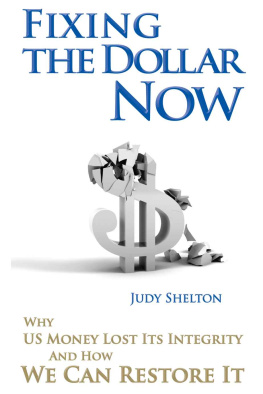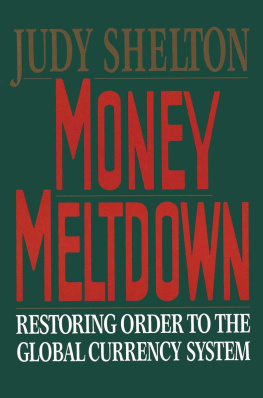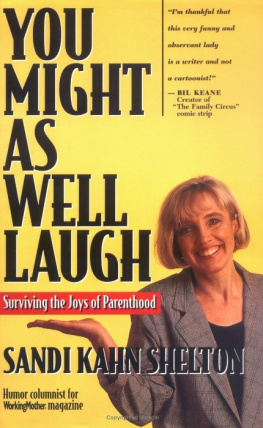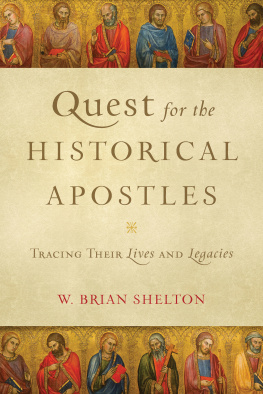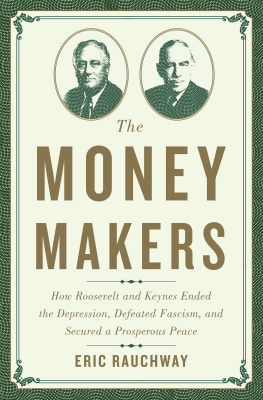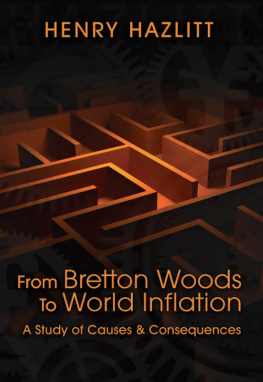FIXING THE DOLLAR NOW
Why US Money Lost Its Integrity
and How We Can Restore It
JUDY SHELTON
Senior Fellow
Co-Director of the Sound Money Project
Atlas Economic Research Foundation
INTRODUCTION
The idea of fixing the dollar can have various meanings. In the international sense, it can mean fixing the exchange rate of the dollar to other currencies. Or it can mean fixing the value of the dollar to some kind of universal measure of monetary value, such as gold. But it could also mean fixing the dollar because it is broken and no longer provides a meaningful way to measure productive growth in the real economy.
This last meaning is the one that will receive our primary attention in this study because it goes to the heart of what the United States needs to do to reclaim its virtue as well as renew its economy.
For some, the word virtue may seem out of place in a treatise on money, finance, and economic issues. We usually reserve such terms for subjects involving moral behavior. But what is money if it does not accurately and reliably serve as a measure of value so that people can make decisions with confidence based on prices in a free market economy? What is money if it cannot be trusted as a store of value?
The whole purpose of money is to provide a dependable measure to function as the recognized unit of account so that individuals are able to carry out financial and economic transactions efficiently. When the money is broken, it fails to perform this fundamental role in society; it feeds a certain distrust of markets in general. People may feel they have accumulated a certain amount of wealth through hard work and planning, only to see it all disappear as the stock market goes into meltdown. Of course, no one expects guaranteed outcomes when savings are put at risk; its the nature of capitalism to fund productive investments with the financial seed corn that has been put aside by people as foregone consumption. When you have confidence that your savings will be used in a way that will lead to greater resources in the future, when you believe that the merits of an investment have been accurately evaluated based on projections of future returns, you are willing to sacrifice today for a better tomorrow.
But what if it all turns out to be a con game?
What if the money that you were relying on to convey accurate signals about the value of investments were being manipulated by its issuer to help achieve a different set of objectives? Prime examples would be making it easier for the government to sell its debt instruments or encouraging people to purchase homes they could not afford. These goals may not seem nefarious per se ; they might even be defended in the name of serving the public good.
While a free people can decide what government priorities should be indeed, it is their duty as citizens the disturbances to free market interactions when money has been distorted are more damaging than the presumed benefits would justify. Does it make sense to allow the issuer of US money, the Federal Reserve, to purchase the debt issued by the US government through a process that expands the number of dollars in the system? Is it really socially beneficial to lure people into taking on mortgages by manipulating interest rates and creating government-subsidized lending programs?
Can it possibly be worth compromising the integrity of the monetary unit of account for the US population as a whole not to mention the impact of dollar distortion in the global marketplace just to enable our government to influence credit allocations in pursuit of its own objectives for engineering the economy? If money serves such a vital function in maintaining the viability of democratic capitalism by furnishing an accurate tool of measurement and meaningful store of value, should it be so easily yielded up to government as a policy instrument?
The main argument in this treatise is that private sector determination of the money supply results in more effective utilization of financial and economic resources than government-controlled money unrestricted by any kind of automatic discipline in other words, subject only to discretionary monetary authority. In terms of political philosophy, it is akin to placing more faith in the wisdom of the free marketplace as expressed in the aggregate decisions of countless individuals than relying on the omniscient judgment of a handful of government-appointed officials. It is not to say that the Chairman of the Federal Reserve or other members of the board of governors, who comprise the policy-making committee of the Fed, have less-than-stellar qualifications or less-than-noble intent. It is rather to suggest that any such committee seeking to direct financial flows of investment capital through the American economy immense in its complexity, diversity and dynamism has already overestimated its own capabilities.
Whats more, it has exceeded the intended monetary authority granted to government by our nations Founders. In the Constitution, the power of Congress to coin money and regulate its value is conveyed in the same context indeed, in the very same sentence (Article I, Section 8) as the power to fix the standard of weights and measures.
Our money was always meant to serve as a standard.
That is the conclusion drawn in this study after researching the early debates among our Founders regarding the money powers that might be safely granted to Congress. It was not an authority easily rendered; they well understood the temptation for government to abuse its money powers by conferring legal tender status on its own promissory notes. This was to be prevented by defining the US dollar in specific weights of precious metals. As Thomas Jefferson wrote in 1784: If we determine that a Dollar shall be our Unit, we must then say with precision what a Dollar is.
And far from dismissing this early assertion of dollar integrity as a parochial vestige from a former age, this study will reveal that it was consistent with a sophisticated appreciation for international commerce. It showed Americas eagerness to take advantage of opportunities for foreign trade by participating in an integrated monetary system. Then as now, the domestic benefits of having a dependable money unit dovetailed with the potential to reap economic rewards through engagement with the rest of the world.
Today, the overwhelming power of the Federal Reserve to distort the value of our currency is a far cry from having a dollar fixed to gold and silver. We will examine why this quasi-government agency was permitted to become a financial behemoth. This will be accomplished by tracing the slow erosion of limitations on the money powers granted to Congress. By understanding the specific turning points in history leading to our current situation, where the governments borrowing needs are commingled with its monetary authority, we become better positioned to challenge the status quo. We gain greater credibility in arguing that our founding principles make it incumbent on the provider of US money, the issuer, to guarantee the integrity of the dollar.
Again, we speak in moral terms when referring to money. This is because the trustworthiness of Americas unit of account is a profoundly moral issue. It impacts the value of wages, taxes, savings and investments for hundreds of millions of individuals who make countless decisions based on daily prices. If we cant trust the money, we can hardly believe in the virtues of free enterprise itself.
The ultimate purpose of this publication is to put forward new solutions for restoring the integrity of the US dollar. We need to erase the mistakes that have put the Federal Reserve at the center of defining the dollars value; we need to end the practice of having our elastic currency serve as the default mechanism for government fiscal irresponsibility. Even among well-intentioned monetary officials, a budgeting stalemate begets situational morality. We need to instill automatic discipline through gold convertibility. At the same time, however, we have to recognize that the transition process needs to be eminently workable at the domestic level as well as globally viable.
Next page
